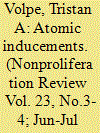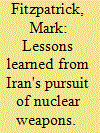| Srl | Item |
| 1 |
ID:
152070


|
|
|
|
|
| Summary/Abstract |
This article argues for an updated strategy to limit the spread of sensitive nuclear technology around the globe. Traditional efforts by the United States to deny countries access to enrichment and reprocessing (ENR) technology are becoming difficult to enforce, while the threat of sanctions against US allies with legal nuclear-energy programs is not credible. As a result, the United States should shift toward a strategy of “buying out” an ally’s ambition for sensitive nuclear technology. Offering military, political, and economic assistance in exchange for stringent nonproliferation commitments will only work when offered at the earliest stage of technical development, before the country builds capabilities that will be difficult or expensive to give up. While there are some practical challenges to implementing such a strategy, the conditions are right to see if lucrative nuclear-energy offers—notably spent-waste management solutions—can induce countries with new civil nuclear programs to foreclose the option to develop ENR technology in the future.
|
|
|
|
|
|
|
|
|
|
|
|
|
|
|
|
| 2 |
ID:
076715


|
|
|
|
|
| Publication |
2006.
|
| Summary/Abstract |
Tipped off by Iran's efforts to acquire uranium enrichment and plutonium reprocessing technology, despite the economic illogic, the United States and its allies identified Tehran's nuclear weapons intentions early on and took effective action to stop several countries from inadvertently assisting that program. This postponed the worst-case scenario of when Iran might have the bomb, which for 15 years has been estimated at being five to ten years away. The intelligence success gave insufficient attention, however, to Iran's procurement efforts through non-state actors on the black market. Intelligence on Iran's motivations also will be important to devising effective policies. Those motivations include a need to achieve prestige, assert national pride, and secure dominance in the Gulf region. Iran's clerical leaders also see a nuclear capability as the best way to ensure their survival despite outside threats and internal opposition. At least 10 indicators of military involvement in the program have become known, reinforcing the judgment that Tehran is still intent on developing a latent nuclear weapons capability. Despite the confirmed evidence, the international community has not been able to change Iran's strategic calculations. The intelligence indicators will need to be corroborated if the world is to summon the will to put firm pressure on Iran to stop its nuclear pursuits.
|
|
|
|
|
|
|
|
|
|
|
|
|
|
|
|